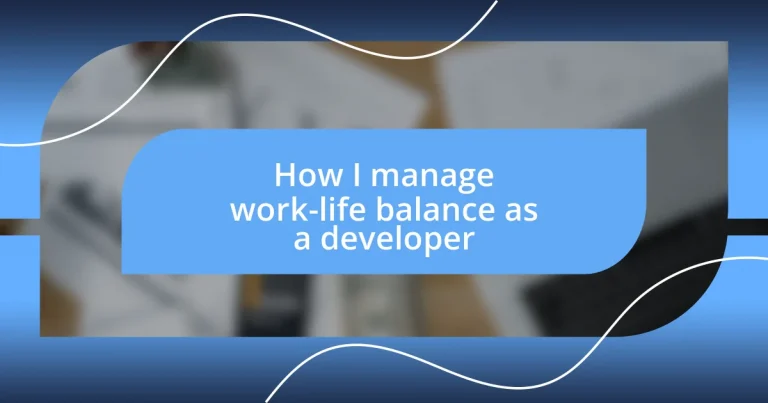Key takeaways:
- Achieving work-life balance involves setting clear boundaries to protect personal time and enhance productivity.
- Utilizing effective time management strategies, like the Pomodoro Technique, helps maintain focus and prevents burnout.
- Prioritizing mental well-being through reflection, colleague discussions, and taking regular breaks fosters a supportive work environment and personal fulfillment.
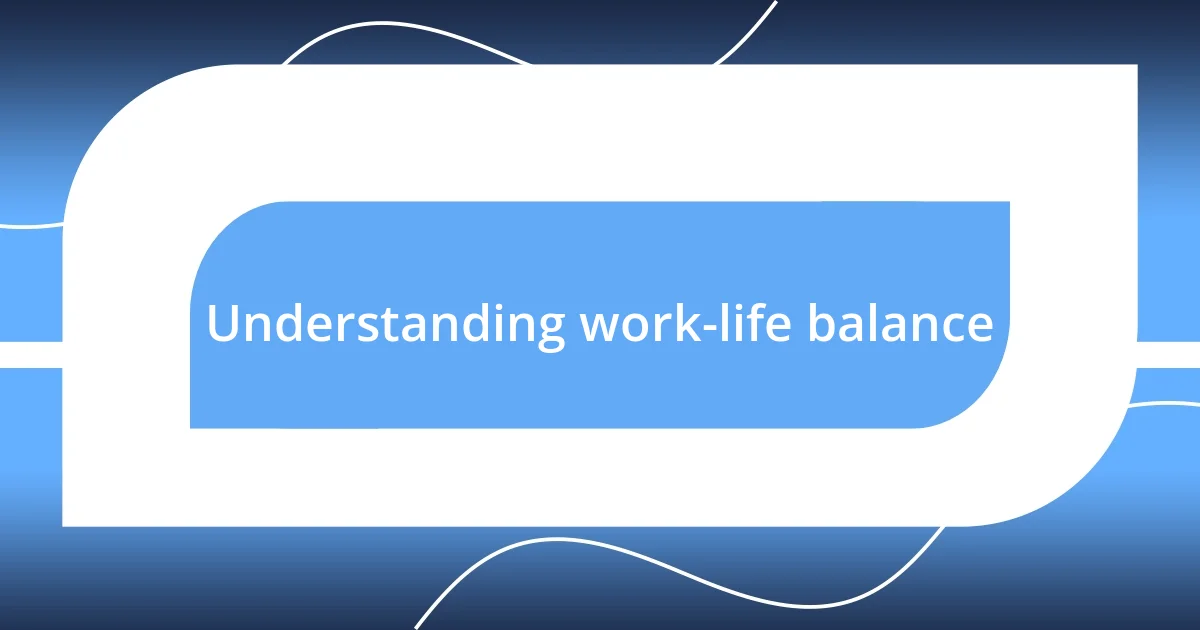
Understanding work-life balance
Understanding work-life balance isn’t just about dividing hours between tasks and leisure; it’s more about the quality of those hours. I remember a time when I was knee-deep in a project, working long hours at the cost of my personal commitments. It felt overwhelming, and I began to wonder—was I really being productive, or was I just busy?
I’ve come to realize that achieving work-life balance means finding harmony with what matters most to you. There was a period when I prioritized work over everything else, only to discover that neglecting my hobbies and relationships left me feeling unfulfilled. Have you ever felt that sense of emptiness after a long week at your desk?
Moreover, work-life balance is a dynamic state; it changes based on life’s ups and downs. After getting feedback from colleagues about my stressed-out demeanor, I started setting clearer boundaries around my work time. Reflecting on those moments, I understand now how essential it is to adapt and prioritize self-care, both for my well-being and my performance as a developer.
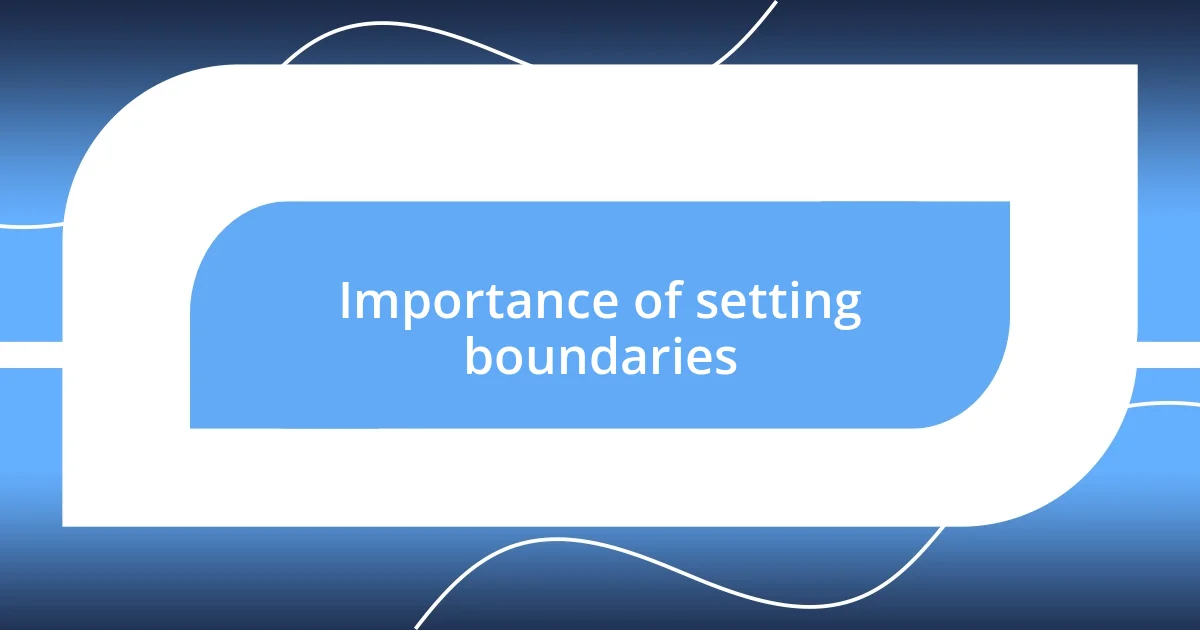
Importance of setting boundaries
Setting boundaries is crucial for maintaining a healthy work-life balance, especially in a field like software development where the work can often extend beyond regular hours. I remember when I made the mistake of not clearly defining my work hours. I’d be replying to emails late into the night, thinking it made me a dedicated employee. However, I quickly learned that this blurred line left me feeling drained and less effective during the day.
By establishing boundaries, I found that I could dedicate my evenings to family and personal interests, which ultimately rejuvenated my productivity at work. I often reflect on this shift; disconnecting from work at a set time helps me switch gears mentally. It’s like a reset button, reminding me that I’m not just a developer but a person with passions outside of coding.
Furthermore, boundaries foster respect with my colleagues as well. When I clock out, I want my teammates to do the same, creating a culture where we all prioritize our mental health. I’ve seen the difference it makes; when we respect each other’s time, our collaboration becomes more focused and impactful—it’s a win-win for everyone.
| Setting Boundaries | Consequences of Not Setting Boundaries |
|---|---|
| Increased Productivity | Burnout |
| Improved Personal Life | Strained Relationships |
| Enhanced Focus | Decreased Work Quality |
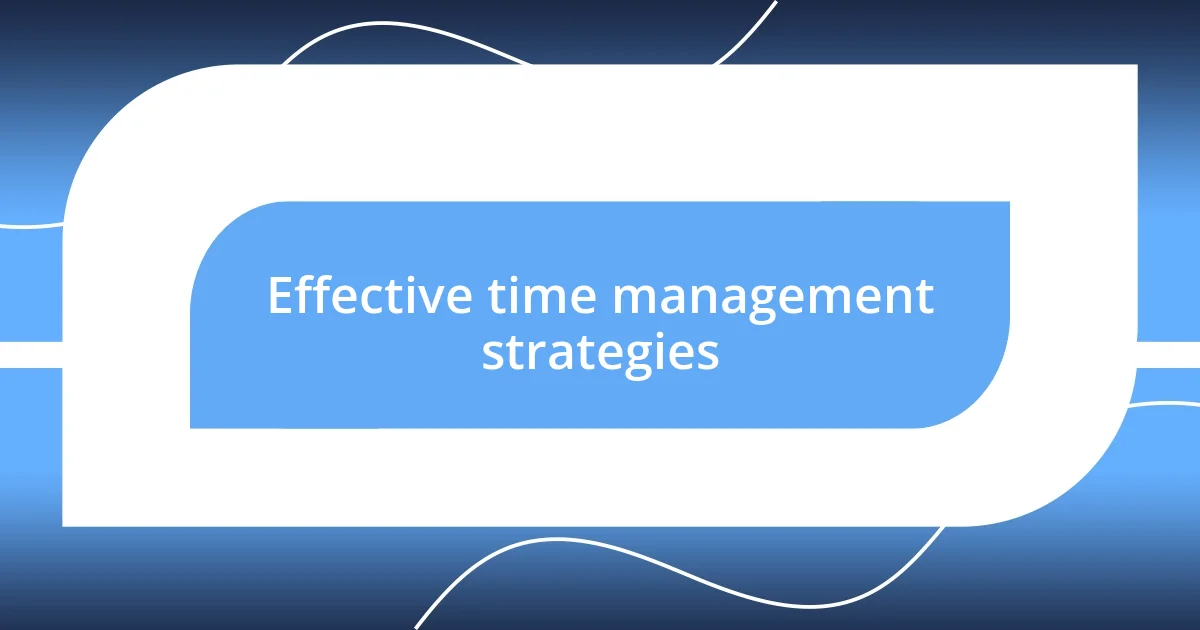
Effective time management strategies
Effective time management is more than just keeping a calendar; it’s about executing strategies that genuinely work for you. In my experience, I’ve discovered that breaking tasks into smaller, manageable chunks makes a significant difference. When I face overwhelming projects, I often deploy the Pomodoro Technique, which involves working in focused sprints followed by short breaks. This not only enhances my concentration but also alleviates the dread of long, unyielding hours.
Here’s a quick breakdown of my go-to strategies:
- Prioritize Tasks: Use methods like the Eisenhower Matrix to distinguish between what’s urgent and important.
- Set Realistic Goals: Aim for achievable daily objectives rather than loading up on excessive tasks.
- Time Blocking: Allocate specific periods in your day for different activities to create structure.
- Limit Distractions: Identify what pulls your attention away and find ways to minimize these interruptions.
- Reflect and Adjust: Regularly evaluate your productivity methods and adapt them based on what works best.
Through this process, I’ve learned to enjoy the work while maintaining a healthy distance from my responsibilities. There was a time when I would easily lose track of the hours spent coding, only to look up and feel the weight of fatigue crashing down—now, I carve out time for short walks or even a coffee break, coming back with a fresh perspective. Embracing effective time management has not only boosted my productivity but also enriched my overall quality of life outside of work.
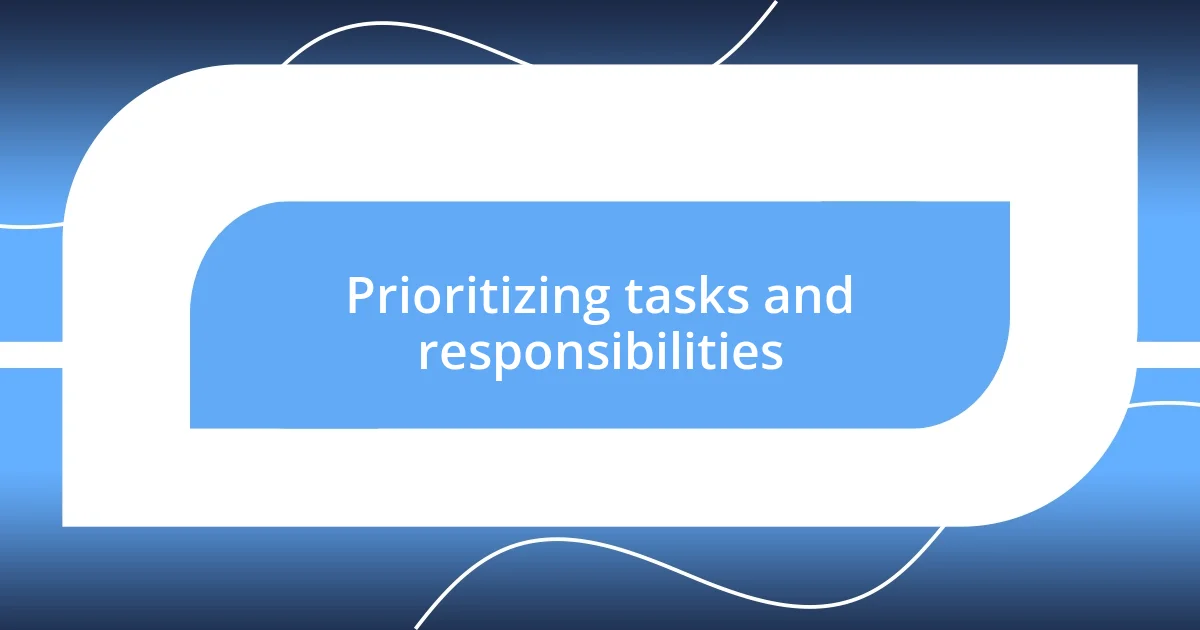
Prioritizing tasks and responsibilities
Prioritizing tasks and responsibilities is about making conscious choices every day. I often find myself staring at a long list of tasks, and I remember the early days when I’d try to tackle everything at once—spoiler alert: it didn’t end well. Now, I ask myself, “What truly matters today?” By determining which tasks have the most significant impact on my projects, I can focus my energy where it counts, leading to a more fulfilling workday.
One strategy I rely on is the “two-top tasks” approach. Each morning, I identify two tasks that will drive my day forward. For instance, when I was working on a challenging app feature that seemed daunting, prioritizing it allowed me to break the cycle of procrastination. This shift not only carved out clarity in my responsibilities but also boosted my confidence as I tackled them one by one. It’s amazing how accomplishing those two tasks feels like a mini victory, fueling my momentum for the rest of the day.
It’s also essential to remain flexible with priorities. Sometimes, unexpected projects come up that threaten to derail your plans. I’ve had days where an urgent bug fix popped up just when I thought I had my day all figured out. Navigating those situations involves quick adjustments and sometimes a heart-to-heart with myself about what can wait. How do you handle interruptions? Personally, I’ve learned that being adaptable not only helps me stay productive but also maintains my peace of mind, allowing me to manage my responsibilities with grace.
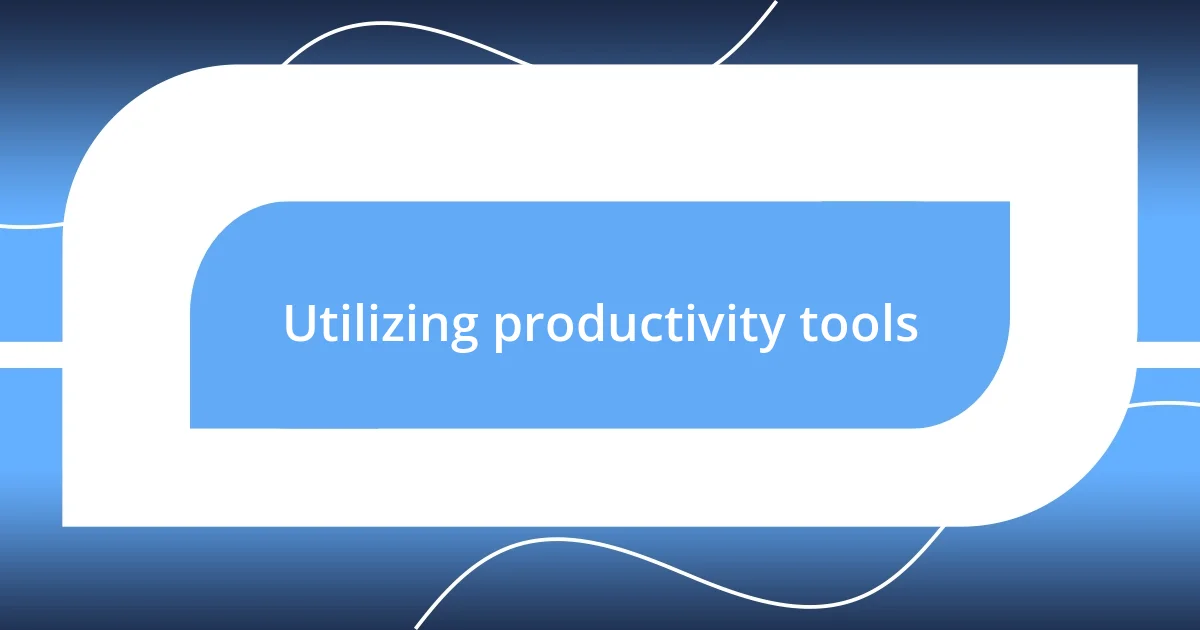
Utilizing productivity tools
Utilizing productivity tools has been a game-changer for me. I often find myself oscillating between various projects and tasks, so I turned to tools like Trello and Notion to organize my thoughts and workflow. For example, I remember a particularly busy week when I had multiple deadlines looming. Having a visual board laid out helped me not only track my progress but also gave me a sense of accomplishment as I moved tasks to the “completed” column. Isn’t it satisfying to see your hard work reflected in tangible progress?
Moreover, I’ve integrated time-tracking apps into my routine as well. Tools like Toggl have allowed me to see where my hours are slipping away. One eye-opening moment was when I realized I was spending too much time in meetings instead of coding—something I could’ve adjusted sooner. I’ve since learned to say “no” to unnecessary meetings, prioritizing focused development time instead. I ask myself, “Is this meeting essential for my progress?” This personal accountability has significantly improved my productivity and, in turn, my work-life balance.
At the end of the day, the right productivity tools can help you make sense of the chaos. There’s a sense of relief when I can check tasks off my list instead of letting them loom over me. I often reflect on how these tools not only streamline my work but also free up time for what truly matters—be it spending time with family, pursuing hobbies, or just unwinding after a long day. What tools have you found helpful in managing your workload? I’d love to hear your experiences!
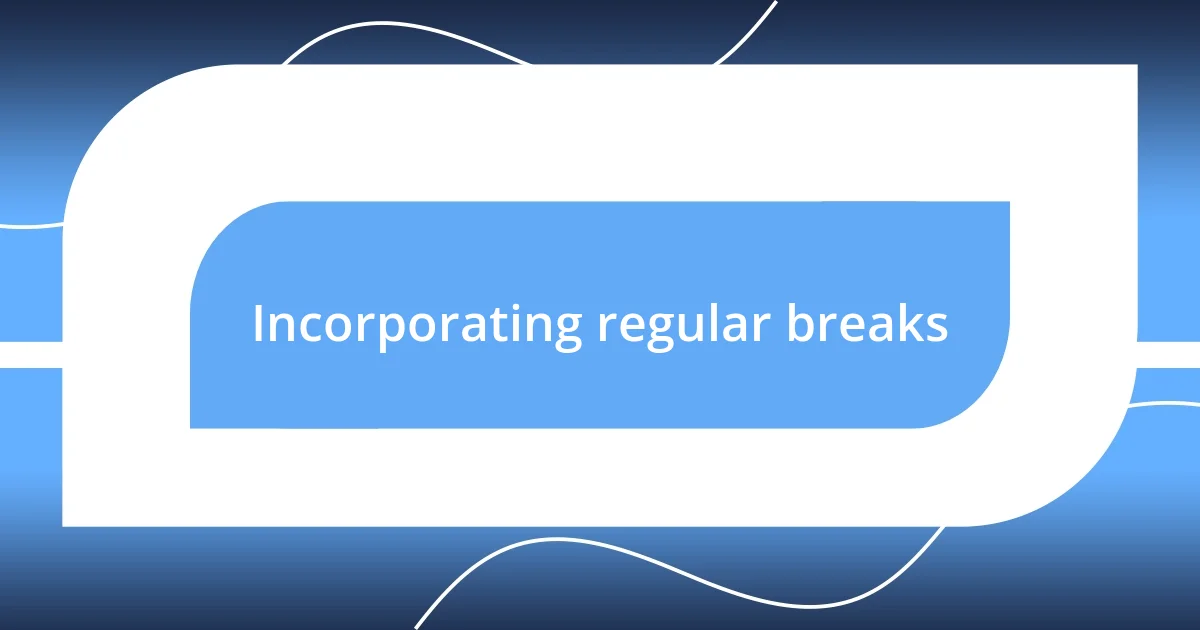
Incorporating regular breaks
Incorporating regular breaks into my work routine has been pivotal for my productivity and mental clarity. I’ve noticed that when I push through hours of coding without pausing, my focus starts to wane—it’s like a fog has settled in my brain. I’ve discovered that taking a short five-minute break every hour allows me to recharge, and I often use this time to stretch or grab a quick snack. Have you ever felt that moment of clarity right after stepping away from your desk? It’s truly refreshing!
One tactic I’ve adopted is the Pomodoro Technique, where I work for 25 minutes and then take a 5-minute break. It may sound simplistic, but I can’t underestimate its impact. I remember sitting in front of my computer, staring blankly at the screen, until I implemented this method. After just a few cycles, I found that those little breaks revitalized my creativity and problem-solving abilities. The best part? I often return to my work with fresh insights, which can lead to quicker resolutions to complex coding challenges.
Reflecting on my experiences, I sometimes treat these breaks as personal mini-celebrations. After a solid work session, I allow myself to indulge in a favorite podcast or a bit of light reading. This not only lifts my spirits but also adds a rewarding layer to my workday. Have you created your own rituals around breaks? By incorporating regular pauses into my routine, I’ve learned to maintain balance—ensuring that I’m not just productive, but also genuinely enjoying my time at work.
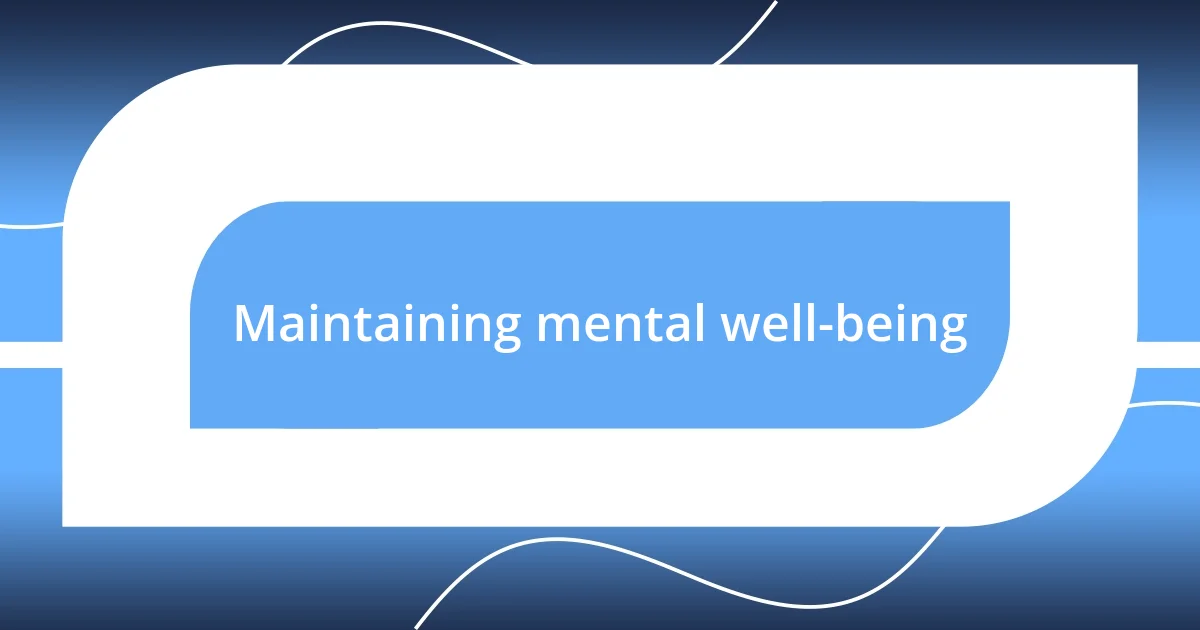
Maintaining mental well-being
Maintaining my mental well-being has become a priority in my daily life as a developer. I’ve found that being conscious of my thoughts can help me stay grounded amidst deadlines and demanding projects. For instance, when those self-doubts creep in, which they often do, I take a moment to reflect on my past achievements. Reminding myself of how I’ve overcome challenges before lets me face new ones with confidence. Have you ever taken a moment to celebrate your own successes? It’s empowering.
Group discussions with colleagues also benefit my mental health immensely. You see, I’ve recognized that sharing struggles can lighten the emotional load. During a recent team meeting, we opened up about the stress of a particularly strenuous project. As we discussed our challenges, I felt a sense of camaraderie that lifted my spirits. Connecting with others allows me to gain new perspectives and discover shared solutions. In these moments, I’m reminded that I’m part of a supportive community.
I can’t stress enough the importance of setting boundaries around work and personal life. I’ve learned to disconnect from work-related communications after hours, which protects my mental space. Last week, I decided to leave my laptop in another room while I spent time with my family. The shift in focus was genuinely refreshing. Instead of worrying about unfinished tasks, I immersed myself in their laughter and stories. How often do we allow ourselves to be present? Embracing these moments makes all the difference in maintaining my overall well-being.












